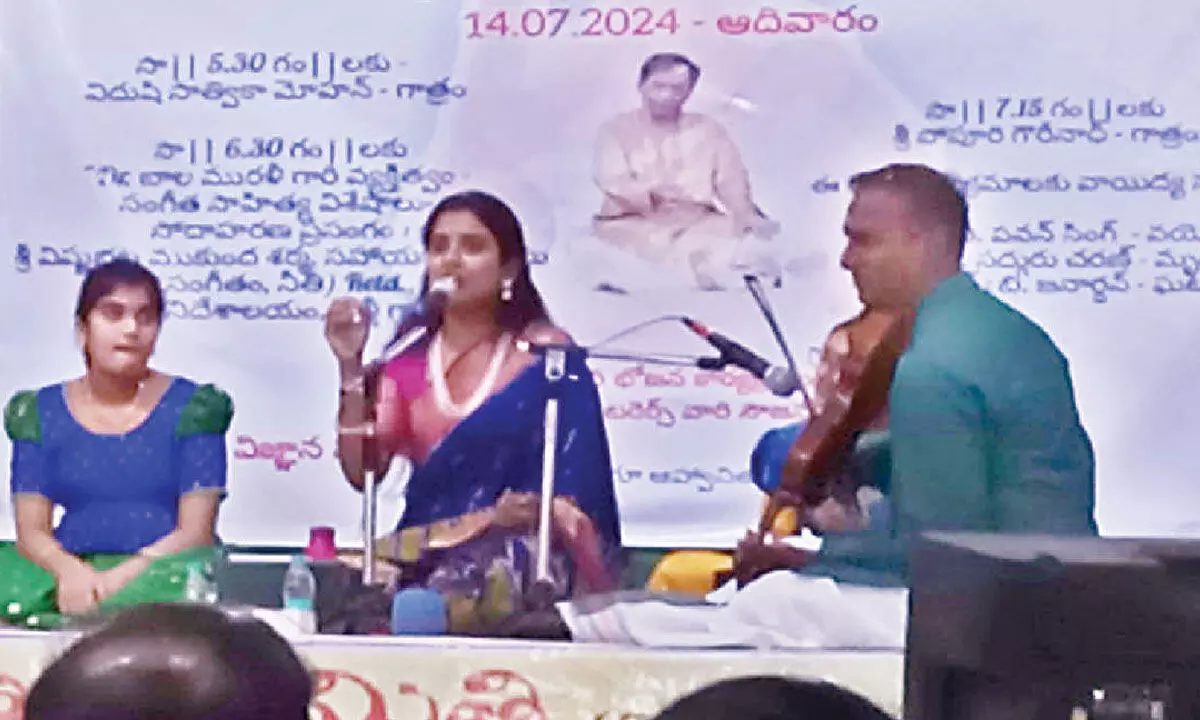Tribute to an Icon: Mangalampalli Balamuralikrishna

This is the week in which many sabhas and cultural organisations are celebrating the birth anniversary of MangalampalliBalamuralikshna, the colossus of Indian classical music
This is the week in which many sabhas and cultural organisations are celebrating the birth anniversary of MangalampalliBalamuralikshna, the colossus of Indian classical music. A multifaceted genius, who was a vocalist of extraordinary prowess, a composer of formidable talent, who could also play several instruments to concert level, and an award-winning film playback singer too, Balamuralikshna cannot be praised enough.
Last weekend, VignanaSamithi, Hyderabad, organised a tribute to him featuring his compositions. Vignana Samithi has been doing yeoman service to the cause of Carnatic music by conducting concerts regularly round the year. It is noteworthy that they give platforms not just to living legends and established artistes but also upcoming young musicians.
The 94th Jayanti Celebrations of MangalampalliBalamuralikrishna commenced with a vocal recital by the talented, young musician Satwika Mohan. She rendered a series of Balamuralikrishna compositions with commendable competence. She was accompanied ably on the mridangam by B. Janardhan and on the violin by B. Pavan Singh.
Brief explanations by Satwika about the composition and its notable features preceded each rendition. She commenced with Amma Anandadayini (Gambhiranataragam). Another composition was Vashama Nee Athishaya Mahima Pogada (Dharmavati ragam). Satwika continued with Kamaladalayatha Lochana (Bahudariragam). Then came a fascinating piece, a krithi rich in swaraksharam! The piece Maa Manini (Thodi ragam) is a testament to Balamuralikrishna’s great swaragyanam and creativity as a composer.
Satwika displayed a calm confidence in her recital. It was good to hear her render a padyam of the legendary saint-poet BammeraPothana, namely Ammalagannayamma, a well-known part of his magnum opus SrimadBhagavatham, a revered work in Telugu literary history, like a viruttham before singing Amma Ninu Korina Korika (Khamasragam). This was heartening considering that BammeraPothana, nowadays, rarely receives the importance and attention he deserves: his birthplace languishes without much attention and copies of his above-mentioned PothanaBhagavatham are hard to come by in bookstores.
The next segment of the programme was a brief lecture by scholar Vishnubhatla Mukunda Sarma on the life and work of Balamuralikrishna. He interspersed his lecture with excerpts from audio-records of Balamuralikrishna concerts. Sarma dwelt on the various aspects of the icon’s personality and professional milestones. Talking of Balamuralikrishna's fame as a child prodigy, Sarma remarked that while most children are drawn to toys, Balamuralikrishna, as a child, gravitated towards the tambura and violin and played them as effortlessly and perfectly as he sang.
In the last and main part of the programme, musician PopuriGowrinath took to the stage next. An AIR A-grade vocalist, Gowrinath has a well-deserved reputation as one of the finer male vocalists among his generation. His command over shruti and laya, large repertoire and renditions steeped in classicism while eschewing gimmickry have earned him respect as a performer. After paying his respects to the icon, Gowrinath commenced his performance with the customary varnam (Gambheeranata). The audience was treated to more krithis in his deep, resonating voice which, interestingly, is somewhat reminiscent of Balamuralikrishna at some places in the lower register or mandhrasthaayi. These included Sri Sakala Ganaadhipa (Arabhi ragam) and thekeerthanaBrihadeeswara (Kanada ragam).
Many have heard Balamuralikrishna render the krithiOmkaara Karini (Lavangi ragam, a scale invented by Balamurali), and now we heard its melodious rendition from Gowrinath. The other impressive renditions were that of Ganalola (ragamalika) and HanumaaAnuma (Sarasangi ragam) with an emphasis on the letter and swara Maa, and Thamralochani (Latangi ragam). A thoughtfully composed tatvamMayaalokamuna was followed by the two customary concert-end-items: namely, a lively thillana (Brindavani ragam) which is popular not only in music-concerts but Bharatanatyam and Kuchipudi recitals too, and the auspicious mangalam.
Gowrinath had three accompanists: K. Sadgurucharan on the mridangam, Pawan Singh on the violin and B. Janardhan (who had played the mridangam for Satwika) on the ghatam. All of them complemented the vocalist's renditions with grace and skill.
The programme was presided over by musician DV Mohanakrishna. It was anchored ably by Venkat Sugnan Vemuri, Secretary, Vignana Samithi. All in all, it was a programme enjoyable to rasikas. However, it would be helpful to audiences and performers alike if such events adhere strictly to a time-schedule, especially in seasons of inclement weather.














